#then they've got to pay that off at the end!!! it's the law!!! otherwise things will just fall flat. i believe in u movie don't let me down
Text
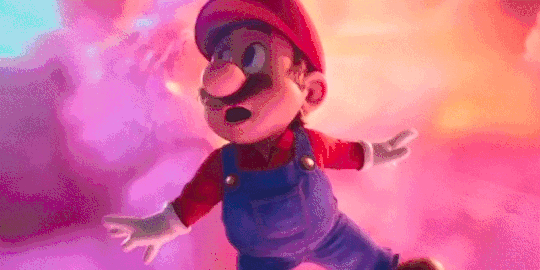

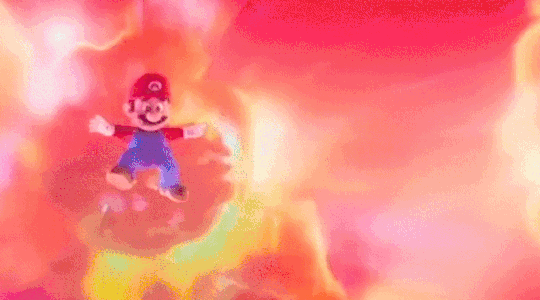
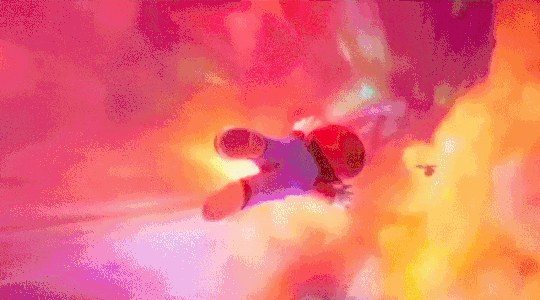



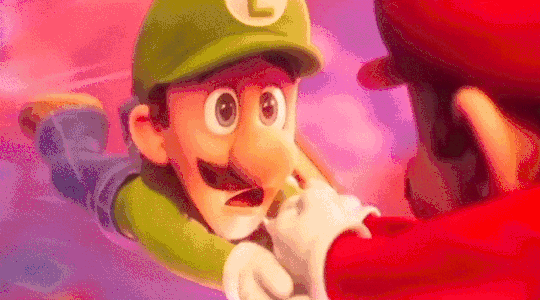
I'm telling you, everything's gonna be all right as long as we're together!
#mario movie#mario movie spoilers#super mario bros#super mario bros movie#super mario bros movie spoilers#cherrysip edits#i've seen so many screenshots and a few scattered gifs but it doesn't seem like anyone's actually done a proper gifset SO#I AM SO NORMAL ABOUT THIS SCENE. SO UNBELIEVABLY NORMAL. I DIDN'T WATCH THIS CLIP 60 TIMES AND CRY EVERY TIME#YOU CAN'T PROVE ANYTHING#but seriously it is unbelievable how sweet these brothers are. i am SO grateful that the movie is actually giving a lot of emotional weight#to their relationship! i just can't get over how mario is wholly focused on soothing luigi because that's what's important to him#and how luigi does relax and smile because he trusts his brother wholeheartedly#PICTURES TAKEN SECONDS BEFORE DISASTER :( :( :( :( :( :(#i also love how you can tell mario genuinely did not know that luigi was sucked in too (this is confirmed in the newest tv spot too)#and so he's kind of in quiet awe of where he is and then HE SEES LUIGI and PROTECTIVE BIG BROTHER MODE activates instantly#their reunion in the movie is actually going to end me. i will leave my mortal body behind and rejoin the sea. IT BETTER BE GOOD#but after this i don't see how it CAN'T be. this relationship is clearly the heart of the movie - if it's already emotional in this scene#then they've got to pay that off at the end!!! it's the law!!! otherwise things will just fall flat. i believe in u movie don't let me down
402 notes
·
View notes
Text
Kaiser's characterisation and the flashback's position in the timeline
Chapter 243's official English release is available, and it's the most insight we've had into Kaiser (and Ness's dedication to him) since they've been introduced. So forgive my rambling.

My initial impression of Kaiser in this chapter was that Rin has a rival for the mantle of edgiest teenager. Did that little diatribe cut his tongue on its way out?
More seriously, have a lengthy analysis of both the timeline and Kaiser's character under the cut, featuring references to Christianity. Years of Catholic upbringing are finally paying off /s
Timeline
I always get hung up on event dates when it comes to Blue Lock (cos I write post-canon stuff and like to keep the lore consistent). It seems like the Bastard Munich try-outs took place not that long before the Neo Egoist League started—maybe as little as a year beforehand?
I believe the flashback takes place around April 2018, or the year before at the earliest. Here's my reasoning.
The panels of the outdoors in chapters 242 and 243 give spring vibes. More tellingly, Kaiser and Ness don't seem all that much younger than they do in the NEL. The main indicator of time elapsing between the flashback and the present manga setting is the addition of Kaiser's crown and thorns.

There's no legislation underpinning the legal status of tattooing in Germany (same as Ireland). But the industry tends to self regulate in the absence of law; another source mentioned that in Germany, people aged 16 or 17 may receive a tattoo only with the consent and/or presence of their legal guardian.
Did Kaiser have anyone in his life willing to accompany him to get a neck tattoo before he turned 18? My hunch is not, based on what he's hinted at in this chapter. So maybe he is 18 in this flashback... or maybe he got a back-alley tattooist to do the rose for him while underage. 🤷♀️
In any case, he was likely 18 by the time he got the sleeve done, putting him at either 18 or 19 during the Neo Egoist League. I like @echari3's theory that he's a Christmas baby for reasons I'm about to touch on; that would put him at 19 as of 25 December 2018. He can't be any older; otherwise, he'd be playing in the regular men's league, not at U20 level.
Ness is outwardly quite impressionable and childlike, so he strikes me as being younger than Kaiser or even Isagi—maybe 17 during the NEL? But who knows.

Strange trinity: Kaiser's characterisation
Anyway, back to Kaiser. This is something echari3 has already talked about, as have others, but this chapter further supports the allegories around how Kaiser is perceived (or portrayed) as a Christ-like figure.
The way he offers his hand to Ness—someone in despair, who lacks camaraderie and vision—gives strong Jesus vibes. At least visually; in terms of dialogue, Kaiser speaks like a kid who's decided swearing every other sentence makes him sound tough. But I digress.

Furthermore, Kaiser is capable of "miracles"... at least in a footballing sense. The way this scruffy kid drives a reversal of fortune in this game defies expectations.
His strong kicks and positioning sense are awe-inspiring to Ness, who looks at Kaiser like he's his personal saviour by the end of the match. Because he is. Through Kaiser's intervention, Ness is able to leave his cruel family home and pursue "magic" as a professional footballer. He becomes his first follower.
Kaiser goes on to get thorns tattooed around his arm, as well as a crown on his hand. A crown made of thorns is heavily associated with Jesus Christ (another nod to echari3, who made this connection in her post 💙).
If I had more time to re-read the NEL volumes, there's further similarities between Christ and Kaiser that I'd like to delve into. For one thing, as of the Ubers match, Kaiser is close to being persecuted by Isagi and his teammates, who seek to establish their own dominance over Bastard Munchen. His role as the "king" is being questioned, as Christ's claim to be the Son of God was. It'll be interesting to see how that pans out. Will Kaiser punish the non-believers... or will he be betrayed? Will he appear to die... only to be resurrected at a future date? *cough* the U20 World Cup
Anyway, that's a post for another time. The Christian symbolism doesn't end here though; it just takes a swerve in later panels.
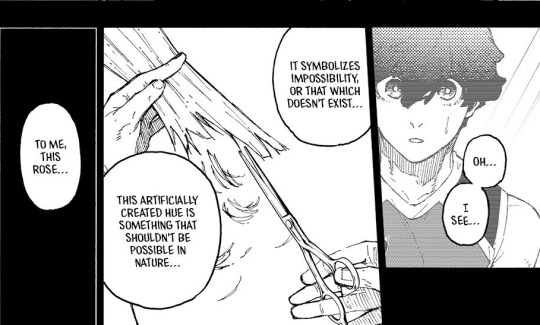
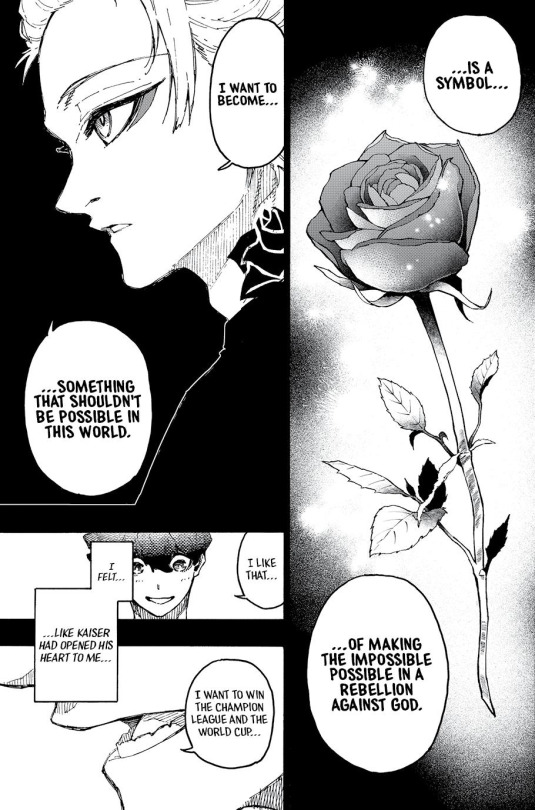
Anyone familiar with the Bible will be aware Kaiser is overtly connected with that mythos: he is named after Michael, a high-ranked archangel. The name itself can be interpreted to mean “who is like God?” (a rhetorical question, since there are none like God according to scripture), or alternatively “gift from God.��
The Biblical angel has many roles and associations, but he is primarily regarded as a warrior, acting as the leader of Heaven's army. Furthermore, Wikipedia references a source which states: "He is viewed as the angelic model for the virtues of the "spiritual warrior", his conflict with evil taken as "the battle within"".
This all tracks in respect of Kaiser's characterisation. He is a strong, tall player with incredible strength, endurance and accuracy. He has a weapon (Kaiser Impact) and appears both omniscient (due to MV) and omnipresent (due to his good playmaking and positioning sense) at the start of the NEL. He's exceptional in every sense. He also has some... issues, psychologically. There's definitely a struggle going on under that ridiculous mullet.
But Kaiser's dialogue in the blue rose panel is interesting. He states that the rose symbolises "making the impossible possible in a rebellion against God". This wording brings to mind another Biblical figure: also an angel, but, er... on the opposite side.


This verbal allusion to Satan tracks with Kaiser's rather villainous aspiration to cause his rivals despair. It fits well, being that the Devil is said to reside in Hell, a place that is almost always depicted as being deep underground.
In conclusion, Kaiser's characterisation is multifaceted. He has the ability to inspire and lead others; he is capable of miracles; he is comparable to a god among U20 league footballers; he is waging a war on behalf of Bastard Munchen against his Japanese teammates; and he desires to send all his rivals to metaphorical hell. God, Angel and Devil, all in one. He's his own strange Trinity.
Without further information about his backstory and the reason for his desire to overcome "God", it's hard to draw conclusions. But he's certainly a fascinating little jerk.
I have some theories on what Kaiser's life looked like before meeting Ness, but that warrants its own post another time.
#blue lock#blue lock manga#blue lock manga spoilers#blue lock spoilers#bllk chp 242#alexis ness#michael kaiser#kainess#mine#blue lock analysis#bllk analysis#boinin talks bllk#long post#tw christianity
92 notes
·
View notes
Text
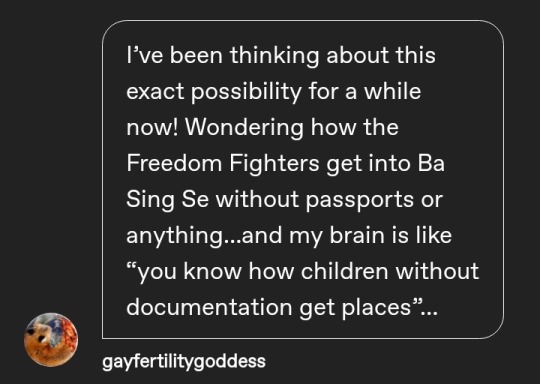
@gayfertilitygoddess i've thought about it pretty extensively. Before I got popular-ish for being a real life eskimo in the fandom, i made a passing coment about the headcanon and it was my most requested topic until people started asking more cultural questions (names and language-related questions seem to be more popular now).
Funnily enough, and I do try to keep this blog otherwise drama free, this was springboarding off of discussions about headcanons with Jin in sex work, which got an absolute brat calling me a "pathetic, sexist loser" in a reblog of the post. I kept it off the main tag and tagged it "sex work mention" (as I do with all of these posts) so I have no idea how she found it to make gross accusations at me. I reblogged to say that her insisting that objective discussions of sex work were inherently slut-shaming was really hurtful as someone who had to consider it from a young age (home isn't always safe and favors/cash are useful at -30°F, we'll just leave it at that). She sent me asks to say that she "didn't mean to be hurtful" but also wouldn't apologize for what she said. She didn't have a damn thing to say about headcanon'ing Jet resorting to sex work, despite it having much more to do with his personality and the way he presents himself than with Jin, where it was entirely about her circumstances as someone in the poor side of a big city. She's since been blocked.
But yeah, Jet's most marketable asset to civilians who just want to escape violence is his charisma. His own comments and Smellerbee's suggest he promised that he'd stop fighting and stealing for the time being. He tells Zuko-as-Lee that "We [outcasts] have to watch each other's backs. Because no one else will." Zuko had his uncle to be his rock and managed to rely on the kindness of strangers when he went on his own. Jet had two friends whom he felt responsible for as their leader. We don't even get canon confirmation that he's fully literate. All of these things combined make finding any kind of employment very difficult, and that doesn't even take into consideration that he can't set down roots. He's trying to get to safety. He can't be obligated to stay in any one place that isn't his destination. There aren't a lot of options.
I feel like this would add to him needing to get out of territory that could be occupied by thee Fire Nation, given the comics explained that Firelord Sozin was a homophobe and worked that into the law. "You know what they've done to boys like me this past century," Jet would probably say. "And those were the ones on their own side." I can't imagine it wouldn't add to the amatanormative mess I write between him and Smellerbee. He shouldn't have to do this at all let alone by himself, and she tries to offer to help, to pitch in, but he scolds her for it so harshly that she cries. He apologizes later and and tells her she needs to just let him worry about it. Girls are supposed to like it when boys are fiercely protective and self-sacrificing, right?
Another thing about this headcanon is sex workers do and historically have done a lot more than most people tend to think. It's one of the reasons phrases like "selling their body" are grossly inaccurate. There is a lot of emotional labor involved. Some people who hire sex workers do so mostly for the company. Not in an "ahem [*eyebrow wiggle*] company, if you catch my meaning [*wink*]" way, like just actually having another human being in the room. Talking, smiling, laughing at their jokes. People get lonely, so it's only natural to pay someone for intimacy. Sometimes, more often than you might assume, they end up using that time more for emotional intimacy than physical intimacy. Sometimes that's the intention.
I wrote a scene with a situation like that. Jet is hired by an old widow because she claims he looks just like her husband did when they were that young. She holds his hand and kisses his cheek, laughing about how that was the farthest the old man had let her get before they were married, and asks him to help her make dinner. She sings and talks about how they used to walk by the river and how handsome he was, how very shy. At some point she stops saying "he" and starts saying "you," addressing Jet as if he was the man she married all those years ago.
"Am I still pretty?" she asks absentmindedly. "Am I as pretty as you'd say I'd be with lines on my face, a hunched back, and hair like clouds?"
"Of course," Jet says. "You're beautiful."
And she looks at him, but that seems to shatter the illusion. She mentions something about making too much food. That she hadn't had to cook that much since.... Silence. The sad kind that seems to suggest another tragedy. She tells him he should take some for his friends and thanks him for all he's done.
(There was also an OC concept I had who was a gay sex worker sharing his home with queer artist friends at the tail end of Firelord Sozin's reign, but this post is already long enough)
#sex work mention#keeping this off the main tag so i don't corrupt anyone#congrats on unlocking my oldest special interest#i could talk about this for hours#and will given half the chance
99 notes
·
View notes
Note
(1/2)Sorry if this is a dumb question, but I was wondering your opinion since you reblogged that union post. So like... how do union members survive while striking? Up until getting into college courses, everything I'd heard about unions was really negative (they've been just about completely killed in this state). My grandfather had a union job at a steel plant, and he always complains about the same two things about it. The dues (which is something I've already figured out), and (cont.)
(2/2 union question) and striking. He was the sole provider at the time with (by the end) eight children to feed etc. So is there, like, some sort of safety net for this sort of thing, or is the point of a strike like a game of chicken between the company’s profits and the workers starving to death/being evicted? Sorry again if this is actually some easily Google-able question and I’ve just missed it before, but I would really appreciate any insight you could offer.
I’m unfortunately not super qualified to answer – while I know a bit about the history of unions in the US, I’ve never participated in a strike except solidarity marching outside of work. So what I can offer is mostly anecdotal, but I will offer it! Read more behind the cut!
Up front: if you google “history of labor unions” or “history of organized labor” you will have to do a lot of reading to understand in specific how dues and strikes work, but given you’ve been raised in an anti-union environment it may be very useful to you to understand the writers and thinkers of the union movement in any case, if only so that you have both sides. Unions are imperfect but they’re also really necessary. The entire 19th century basically proved that motherfuckers can’t be trusted to run companies equitably.
Often, yes, a strike is a game of chicken, especially if the company brings in scabs (workers who will work, usually for very low pay, during a labor strike) or strikebreakers (violent people who will assault, and sometimes murder, union leaders or visible, vocal strikers – google “pinkerton strike breakers” or watch the film “Matewan” for more information on that). Labor strikes are most effective when all participate – if you literally can’t run your factory/mine/whatnot, either because nobody will work or because those who would work are unwilling/afraid to cross the picket line, then the strike ends fairly quickly. And usually it ends in compromise, because a strike is a last resort when unions are desperate, it’s not something they do for funsies. It’s why often other unions will strike in solidarity with a striking union, to make their companies put pressure on the company in conflict with the union. It’s also why you sometimes see Scabby the Rat outside of protests – it’s a giant inflatable rat that draws attention to the fact that the workers are striking, which is bad PR.
What’s interesting about your grandfather’s dual-complaint is that it shows he may have had an incomplete understanding of what the union did for him (or, admittedly, he might have had a shitty union). Often dues are not just for the running of the union but also go into a fund to support striking laborers – some unions pay laborers a stipend (usually not full salary) while they strike, or at least contribute something to supporting the family; you can google “strike benefits” or “strike stipend” for more information about this. Before more stringent labor laws came into effect, dues also went to things like supporting the families of those injured or killed on the job, who usually got nothing pre-union. It was like unemployment or accident insurance – sure you may never use the money you pay in, but SOMEONE will, and if you do need it, at least it’s there.
Union bargaining is one reason gutting welfare is so good for corporations: if you go on strike you are essentially earning no income, and unemployment support and food assistance can ensure striking union laborers last a lot longer on strike.
I don’t wanna paint an overly rosy picture of unions. They are human organizations and subject to all the flaws thereof. My union when I belonged to it was fucked up – the entire board of the union was caught in an embezzling scam and resigned the week after I joined. It also fucked a friend of mine because he had just gotten a permanent union job when several union workers were laid off, and because one of them was more senior than him, he was removed from the job (first-in-first-out) and she was given the job instead. This also incidentally fucked me since I had to work with her and she was not qualified for the job she was given.
It was unfortunate for her, too, but in the end it meant someone older and less able to get another job got a chance to stay employed, while my friend, who was a young college graduate with diverse work experience, had better prospects and did get another permanent job inside of a month. And the existence of that union, even as fucked up as it was, means that I still, as a non union member, make better money than I otherwise would.
Because the goal of the union is that we all make sacrifices for each other instead of for the bosses. Those dues your grandfather paid and the threat of striking were small compared to the benefits the union brought him in the form of a shortened workday and work week, higher wages, and the power of the union to force the steel plant to give him benefits like regular raises and paid sick leave.
The problem is, of course, that once a union is established, people entering the workforce after it exists don’t always understand why it was necessary, and take for granted what the union has given them. That’s why it’s so important to teach the history of organized labor – which I got in school but very few people do except in an abstract “this is the industrial revolution” kind of way.
If you work for a wage, the history of the union is your history, and it’s useful to know it.
254 notes
·
View notes